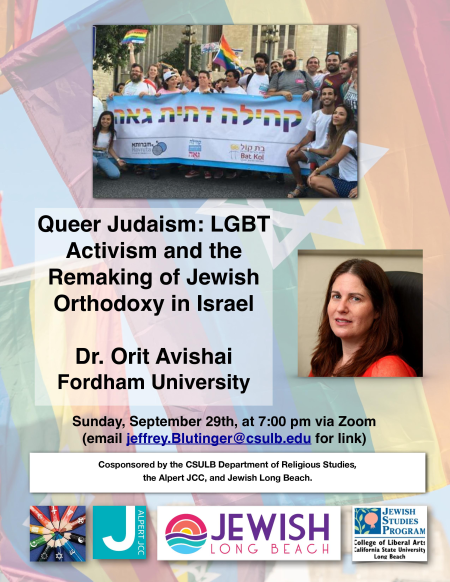Queer Judaism: LGBT Activism and the Remaking of Jewish Orthodoxy in Israel

The CSULB Jewish Studies Program is very pleased to announce that our first speaker for the fall semester will be Dr. Orit Avishai, Professor of Sociology and Women, Gender, and Sexuality Studies at Fordham University. Her talk is entitled “Queer Judaism: LGBT Activism and the Remaking of Jewish Orthodoxy in Israel.” The talk will be on Sunday, September 29th, at 7 pm over Zoom.
Here’s the Zoom link: https://csulb.zoom.us/j/81806521415
Dr. Avishai’s talk is generously cosponsored by the CSULB Religious Studies Department.
Her talk will be based on her recently published book of the same name. In it, she will offer a compelling look at how Orthodox Jewish LGBT persons in Israel became more accepted in their communities.
Until fairly recently, Orthodox people in Israel could not imagine embracing their LGBT sexual or gender identity and staying within the Orthodox fold. But within the span of about a decade and a half, Orthodox LGBT people have forged social circles and communities and become much more visible. This has been a remarkable shift in a relatively short time span. Queer Judaism offers the compelling story of how Jewish LGBT persons in Israel created an effective social movement.
Drawing on more than 120 interviews, Orit Avishai illustrates how LGBT Jews accomplished this radical change. She makes the case that it has taken multiple approaches to achieve recognition within the community, ranging from political activism to more personal interactions with religious leaders and community members, to simply creating spaces to go about their everyday lives. Orthodox LGBT Jews have drawn from their lived experiences as well as Jewish traditions, symbols, and mythologies to build this movement, motivated to embrace their sexual identity not in spite of, but rather because of, their commitment to Jewish scripture, tradition, and way of life. Unique and timely, her research challenges popular conceptions of how LGBT people interact and identify with conservative communities of faith.
Like all Jewish Studies speakers, this event is free and open to the public. There is no need to rsvp.




